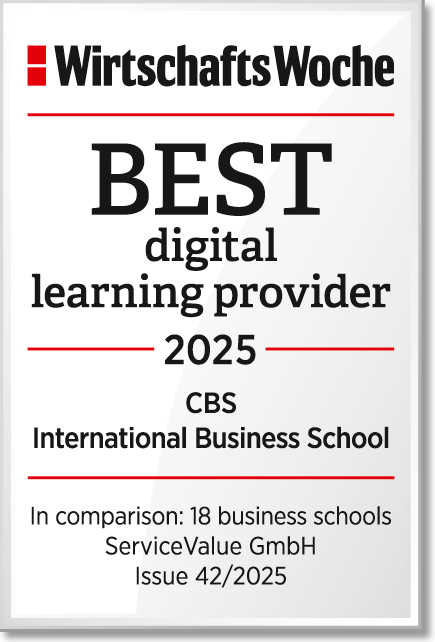Digital Marketing (M.Sc.)
Think Strategically, Act Digitally – Your Online Marketing Master’s!

Your Digital Marketing Master Programme – A Career at the Intersection of Storytelling and Strategy
Digital marketing is about more than reach – it blends data, creativity, and strategy to drive sustainable growth. The English-taught Master’s in Digital Marketing at CBS teaches you how leading brands succeed online, connect with audiences, and create experiences that stand out.
The programme combines marketing psychology with advanced digital expertise. You’ll learn to use data analytics, AI, and behavioural insights to understand target groups and craft measurable, effective strategies. Courses such as AI-Based Data Research, Consumer & Advertising Psychology, and Brand Management & Customer Acquisition build both creative intuition and analytical precision.
What makes this programme unique is its focus on the entire digital customer journey – from branding and content to monetisation and customer retention. You’ll design strategies that strengthen brand loyalty and long-term growth. At CBS, you’ll learn by doing: working on projects with real companies, developing campaigns, and presenting your ideas to industry experts. Professors with backgrounds in digital agencies, corporations, and start-ups provide practical, industry-focused insights.
Based in Germany’s innovation hub Cologne, you’ll study in one of Europe’s most dynamic digital economies.
This study programme is part of our NEW ERA - Master programmes.
*Tuition fees differ for EU and non-EU students. For the specific fees please check the tuition fees information page. Status: April 2025.

What Sets Digital Marketing at CBS Apart

Real Projects. Real Impact
Solve real challenges from companies like E&Y, UPS, and KPMG and present your solutions directly to decision makers.
Learn from Leading Experts
Learn from former C-level leaders, managers, and consultants who bring real-world leadership and consulting experience into the classroom.
NEW ERA Education for Future Leaders
The NEW ERA master concept links academic depth with hands-on application. You strengthen analytical thinking, decision making, and the ability to apply knowledge using AI tools and real business formats.
Study Globally. Work Globally
Study in an international community with students from 75+ nations and build the intercultural skills needed for leadership roles in global organizations.
Curriculum
Economic Analysis & Global Markets
6
ECTS
- Apply tools of economic analysis to understand market dynamics
- Gain critical insights into international trade, foreign exchange, and interests
- Analyse economic forces in trade policies and global markets
- Understand international capital flows and financial institutions
Strategy Development
6
ECTS
- Apply strategy-making processes and strengthen strategic reasoning
- Turn analysis into sustainable strategy
- Play the strategic chess of business with foresight
- Master decision-making from firm to network level
AI Based Data Research
6
ECTS
- Use AI to automate data collection and analysis
- Generate insights faster — with reproducible, transparent AI research pipelines
- Turn unstructured information into decision-relevant intelligence — at industry speed
- Apply data analytics and scientific methods to real data
Consumer & Advertising Psychology
6
ECTS
- Analyse and understand consumption growth and development
- Know the value of consumer satisfaction, retention, relationship
- Apply psychology to advertising and marketing
- Understand mechanisms of advertising and their underlying strategy
Digital Marketing
6
ECTS
- Master digital marketing principles that drive sustainable business growth
- Create strategies that deliver measurable value to customers throughout their lifecycle
- Design customer-centric approaches that balance acquisition, retention, and brand building
- Apply growth marketing frameworks to optimise funnel performance
Empirical Research & Visualisation
6
ECTS
- Design attractive visual narratives that effectively communicate research findings to stakeholders
- Apply visualisation best practices to present empirical evidence in formats that engage audiences
- Master research design principles and methodologies to investigate business questions
- Analyse quantitative and qualitative data using statistical tools to derive meaningful insights
Brand Management & Customer Acquisition
6
ECTS
- Develop brand strategies and build awareness across multiple channels
- Master acquisition to maximise conversions and optimise marketing spend
- Create compelling brand identities that resonate with target audiences
- Implement strategies that attract high-value customers and scale growth
Channel & Content Management
6
ECTS
- Design multi-channel strategies that deliver consistent messaging across platforms
- Produce content that drives audience engagement across the customer journey
- Develop content strategies that support organisational goals and strengthen brand positioning
- Integrate channels to create seamless customer experiences across the entire journey
Business Model Analysis & Industry Comparisons
6
ECTS
- Adopt a holistic view of corporate business models
- Integrate knowledge from your studies into real business and industry analysis
- Develop practical, cross-disciplinary solutions to complex cases
- Solve complex business model challenges
Managing Change with Projects
3
ECTS
- Become a project manager who contributes to value-based business development
- Set up projects to solve real problems and use project reviews
- Apply the techniques and methods that make projects successful
- Achieve change with change management methods
Leadership & Executive Development
3
ECTS
- Learn core leadership concepts and latest research insights
- Combine scientific principles with practical tools for effective leadership skills
- Strengthen your personal leadership profile through communication skills and confident decision-making
- Develop an understanding of leadership skills for modern organisations
Event Lab
3
ECTS
- Develop an event (TedX/leadership/team building/company/else)
- Design and carry out the event marketing to potential participants
- Organise the event and carry it out in concrete terms
- Perform the event review & retrospective
Project: Consulting a Company
9
ECTS
- Receive a consulting challenge from a real client company
- Define and scope a real consulting project in a team
- Develop evidence-based solutions and actionable recommendations
- Present your recommendations to the client company
Monetisation & Customer Loyalty
6
ECTS
- Design pricing strategies and revenue models that maximise profitability
- Build loyalty programmes that increase customer lifetime value and reduce churn
- Implement monetisation paths and upselling techniques
- Analyse customer behaviour to identify monetisation opportunities
Sustainability & Corporate Responsibility
6
ECTS
- Discuss corporate responsibility for social and environmental developments
- Apply stakeholder and double materiality analyses for sustainable strategy development
- Integrate ESG criteria into leadership and decision-making processes
- Strengthen resilience, leadership, and communication through sustainability
Strategic Human Resource Management
3
ECTS
- Develop a strategic alignment of HRM practices
- Consider current HRM trends and best practices
- Get familiar with strategic HRM analysis
- Apply modern methods of HRM
Facilitation, Communication & Negotiation
3
ECTS
- Analyse negotiation scenarios systematically and design effective strategies
- Understand communicative and economic factors that influence negotiations
- Learn how to strategically prepare, conduct and evaluate negotiations
- Develop persuasiveness, tactical thinking and decision-making skills in complex settings
Entrepreneurship & Venture Lab
6
ECTS
- Develop and test innovative business ideas
- Implement the Lean Startup methodology
- Cultivate entrepreneurial thinking
- Develop and define scalable business ideas
Management Simulation Game
6
ECTS
- Lead a virtual company in a simulation
- Make complex managerial decisions
- Assess the impact of business decisions
- Anticipate competitor reactions
Master Thesis
18
ECTS
- Demonstrate mastery of your field by conducting independent research that addresses a relevant business topic
- Apply strategic frameworks and methodologies to analyse complex problems and develop evidence-based solutions
- Synthesise knowledge from multiple disciplines to generate insights and recommendations
- Communicate findings professionally through rigorous academic writing
One Master. Three Tracks
Your career goals are unique, and your study path should be too. That’s why we offer you full flexibility: simply choose the 120, 90, or 60 ECTS track that best matches your academic background, your schedule, and your ambitions. Whether you want to fast-track your entry into the job market or dive deep into specialization, at CBS you can design the Master’s degree that fits your life.
120 ECTS
90 ECTS
Career Opportunities with a Master’s in Digital Marketing
A Master’s in Digital Marketing opens up diverse career opportunities across a wide range of industries. As a manager or consultant, you can work in strategic or operational marketing for international corporations, content providers and agencies, ad-tech companies, or media agencies.
The programme also provides excellent preparation for entrepreneurship. You will benefit from real-world projects with corporate partners and lecturers from the industry, ensuring that you graduate with practical experience and a competitive edge. This English-taught Master’s will prepare you for an international career in the digital marketing landscape.
Below, you’ll find top career opportunities with your Master’s in Digital Marketing.
Why CBS UNIVERSITY
Your path to CBS
Starting your studies at CBS University of Applied Sciences is as unique as you are – and at the same time, completely hassle-free. With our user-friendly online application process, you can apply from anywhere, with no numerus clausus restrictions. Instead of rigid admission requirements, we focus on a personal selection process that highlights your strengths and potential.
Whether you choose a dual, part-time, or full-time programme, CBS University offers the perfect combination of theory and practice.

Admission requirements
The Zugangsvoraussetzungen für dein Master-Studium an der CBS University of Applied Sciences variieren je nach Studiengang . into your studies at CBSSciences is so Like yourself — and at the same time designed. With our easy to use Can you yourself apply, completely without . Instead of staring Waiting for you with us is a that is your strengthsand focuses on potential. Regardless of whether you opt for dual, part-time or full-time study, the CBSUniversity offers you the of
Deadlines
The application deadline is year round open, even before you graduate from high school. For dual study programs, you should sufficient lead time Plan so that we can find your suitable practice partner. The start of studies is flexible: in the winter semester or, for selected programs, also in the summer semester. One early candidature is particularly important for limited study places secure and apply for any necessary visas in good time.
funding
A dual or part-time study Is often used by the Practice partner financed, which is also a valuable occupational provides accompaniment. A full-time study On the other hand, can be achieved by numerous Funding opportunities like BAföG or stipends Personalize to give you an optimal connection of personal Development and academic To make the future possible.
HANDS-ON LEARNING AT ITS BEST
At CBS, it’s not just what you study that matters, it’s how you study. Our programmes offer a completely new learning experience: hands-on, interactive, and firmly rooted in real-world practice. You’ll notice your skill set growing day by day through real projects, modern tools, and intensive practical experience. Our lecturers bring years of industry expertise to the classroom, and regular guest speakers give you exclusive insights into professional life. Artificial intelligence, teamwork, presentations, networking, and real business cases are all part of your everyday studies. It’s not just about preparing for the future – it’s about shaping it yourself.
Business Projects
Im Rahmen der Business Projects an der CBS International Business School haben Studierende die Möglichkeit, gemeinsam mit renommierten Unternehmen an realitätsnahen Projekten zu arbeiten. Diese praxisorientierte Lehrform verbindet theoretisches Wissen mit konkreten wirtschaftlichen Fragestellungen und gewährt tiefe Einblicke in berufliche Abläufe.
Unternehmenskooperation
Dank eines Netzwerks von über 1.300 etablierten Unternehmen aus diversen Branchen profitieren Studierende von exklusiven Einblicken in die Arbeitswelt. Diese Kooperationen eröffnen nicht nur spannende Perspektiven, sondern fördern auch die Entwicklung wichtiger Kontakte und bieten nachhaltige Karrieremöglichkeiten.
Praktikum/Berufserfahrung
Ob in Form von Pflichtpraktika, die fester Bestandteil vieler Studiengänge sind, oder durch die Integration von Berufserfahrung in duale und berufsbegleitende Programme: Du kannst dein Fachwissen direkt in der realen Arbeitswelt anwenden.
HOW DO I FIND MY PERFECT CAREER PATH?
The Career Service and Talent Development team at CBS support you in finding your ideal partner company. With 1:1 coaching, workshops, and a wide network of corporate partners, we guide you throughout your entire time at university. Together, we’ll develop a strategy that matches your strengths and career goals.

Ablauf deS Masterstudiums


Inspiration and Impact – What Our Alumni Say
Let yourself be inspired by the experiences of our alumni and discover how the Master’s degree at CBS has shaped their professional and personal development.
FAQ: The most important questions about studying Digital Marketing
Here you can find answers to all important questions all around your Digital Marketing master's degree. If you have any further questions, feel free to contact us at any time.
What is the Digital Marketing?
The English-taught Digital Marketing Master’s programme provides in-depth knowledge and hands-on skills in online marketing strategies, social media management, content marketing, and data-driven marketing. This programme equips students with the expertise to develop innovative digital campaigns and prepares them for leadership roles in the fast-evolving digital marketing sector.
Why should you study the Digital Marketing Master’s programme?
The Master’s in Digital Marketing offers a unique combination of theoretical knowledge and practical application. Students learn how to develop, implement, and optimise digital marketing strategies using the latest tools and technologies. Graduates are highly sought-after in industries such as e-commerce, media, consulting, and digital agencies.
How long does the Digital Marketing Master’s programme last?
The Digital Marketing Master’s programme typically lasts 4 semesters (2 years) and concludes with the award of a Master of Science (M.Sc.).
Does the Digital Marketing Master’s programme have a Numerus Clausus (NC)?
There is no fixed NC for the Digital Marketing Master’s programme. Admission is based on your Bachelor’s degree and relevant experience in marketing or a related field.
What are the admission requirements for the Digital Marketing Master’s programme?
Applicants need a first academic degree (e.g., Bachelor’s in Business Administration, Marketing, or a related field). Strong English skills are required, as the Digital Marketing Master’s programme is taught entirely in English.
How is the Digital Marketing Master’s programme structured?
The Digital Marketing Master’s programme combines lectures, seminars, and hands-on projects. Students work on real-world case studies and gain experience with industry-leading digital marketing tools such as Google Analytics, SEO tools, social media management systems, and CRM platforms.
Where can I study the Digital Marketing Master’s programme?
The Digital Marketing Master’s programme is offered at the Cologne campus.
What will I learn in the Digital Marketing Master’s programme? What are the core subjects?
Key study areas in the Digital Marketing Master’s programme include:
• SEO & SEA (Search Engine Marketing)
• Social Media Marketing & Influencer Strategies
• Performance Marketing & Data Analytics
• Customer Relationship Management (CRM)
• Digital Brand Management & Content Strategy
Can I study abroad during the Digital Marketing Master’s programme?
Yes! In the fourth semester, you can either study abroad and write your Master’s thesis internationally or complete a minimum seven-week internship as part of the Digital Marketing Master’s programme.
Can I write my Master’s thesis in collaboration with a company during the Digital Marketing Master’s programme?
Yes! In the final semester, you can either spend a semester abroad or complete a corporate internship, providing the perfect opportunity to write your Master’s thesis with a business focus in the Digital Marketing Master’s programme.
Any questions? We're here to help
Do you have any questions about our bachelor's or master's degree programs? Our Student Advisory team is here to support you! Schedule your personal consultation—online or in person—for tailored, non-binding guidance on finding the right study program for you.



























